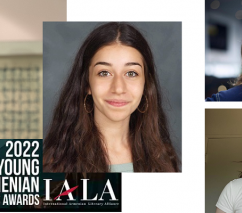IALA x h-pem | The Once-Man
April 04, 2022 - October 02, 2022
What Taleen Sahakian does with imagery is astounding. In her poem, "The Once-Man," the reader is introduced to a mysterious creature with a cryptic message. What at first seems like a fantasy tale about an imaginary beast turns into a parable about an act of violence so deplorable, it burns "all the love in the world to the ground." The Once-Man is a symbol of loss in its most profound form, in the form of mass annihilation of a group of people. Sahakian alludes to our history, highlights the terrors our ancestors experienced but also reminds us of the power of storytelling. This poem comes from an imaginative mind, a curious soul and a lover of symbolism. Ms. Sahakian succeeds in creating an unforgettable character in The Once-Man.
Commentary provided by YAPA contest judge Armine Iknadossian
As I strolled through the shadows of the sands and the rock,
I stopped quite suddenly for fear of my life.
In the deep deep mist was a rough-stained creature
With eyes black yet golden with oil and sand and tears.
I crept my way around this ill and grimy thing,
But as I turned my head to flee, a hand grabbed my arm and cried,
“My love! My love! Oh, where have they taken—”
My heart fell down the stairs of my chest.
I shook my head to say I haven’t quite a clue.
But maybe she was lost in the night…
I sit with the creature now as it keeps me in view,
Slowly clenching its jaw and taking loud breaths.
“What are you?” I ask.
And the creature responds.
“I am the Once-Man, with hands of claw and soul of muck.
Which were once hands of wild flower and spirit of bees.
With eyes of dried mud that used to be flames.
With teeth of stone that were once made of strength.
With a heart that was once whole but is now broken like my people.
I am the Once-Man, for now I am nothing.”
“What happened?” I question.
“They came and broke us, of course!”
“They steal from you?”
“Tore from us.”
“Split you up?”
“And slaughtered us.”
“And your love you said—”
“Burned all the love in the world to the ground.”
“And how did you li—”
“I did not, young boy.
I am the Once-Man, aren’t I?”
 Taleen Sahakian
Taleen SahakianARS Armenian School
North York, ON
15 years old
Any additional references or recommendations? We would love to hear your suggestions!
Join our community and receive regular updates!
Join now!



Attention!